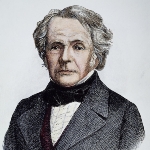Background
Ernst Friedrich Apelt was born on March 3, 1812, in Reichenau bei Zittau, Germany.

Apelt was admitted to the Gymnasium in Zittau, where he studied natural science.
Apelt studied at the University of Jena.
historian philosopher scientist
Ernst Friedrich Apelt was born on March 3, 1812, in Reichenau bei Zittau, Germany.
Following a conventional education at a Dorfschule in Reichenau from 1818 to 1822 and at a Butrgerschule in Zittau from 1822 to 1824, Apelt was admitted to the Gymnasium in Zittau, where he studied natural science. An early interest in mathematics led hint to speculate on cosmological and philosophical questions, and his teachers directed him to Jakob Fries’s Neue Kritik der Vernunft. With characteristic aplomb, he wrote to Fries, commenting on several passages in the Neue Kritik; as a result, he was invited to study at the University of Jena.
Under Fries’s tutelage there from 1831 to 1833, Apelt read mathematics and philosophy. He continued his studies at Leipzig until 1835, specializing in astronomy and physics under the direction of A. F. Moebius. After a brief period in his father’s business, in 1839 he became a Privatdozent at Jena, where he spent the rest of his life. Apelt lectured initially on mathematics and astronomy, later turning to philosophy.
A prolific writer, his inaugural dissertation (De viribus naturae primitivis, 1839) was followed in quick succession by a number of important works on metaphysics, epistemology, and history of science: Die Epochen der Geschichte der Menschheit (1845-1846), Johann Keplers Weltansicht (1849), Die Reformation der Sternkunde (1852), Theorie der Induction (1854), Metaphysik (1857), and the posthumously published Religionsphilosophie (1860).
He died on October 27,1859 in Oppelsdorf, Upper Lusatia, Saxony.
Although his direct contributions to science were slight, Apelt’s influence on German history and philosophy of science was far-reaching. His general approach was much like that of Fries and other first-generation Neo-Kantians: philosophy was conceived of as an analysis of knowledge and reason by the critical method. Apelt’s special contribution to the Kantian tradition was his insistence, both by precept and by example, that scientific knowledge should be the epistemologist’s touchstone and that a careful historical scrutiny of the sciences should be absolutely essential for epistemology. His most important work in the philosophy of science was his Theorie der Induction, which was prompted in part by the controversy then raging among Comte, Mill, Herschel, and Whewell about scientific method in general and induction in particular.
(This is an EXACT reproduction of a book published before ...)
Apelt’s views are probably closest to those of Whewell, which is hardly surprising in view of their common Kantian orientation. Like Whewell, he drew extensively on case studies from the history of science to support his methodological analyses. Moreover, his Theorie der Induction in cludes a lengthy analysis of mathematical induction and the foundations of mathematical inference.

Apelt was the principal contributor to the Abhandlungen der Fries'sche Schule, which he founded with Matthias Jakob Schleiden.

